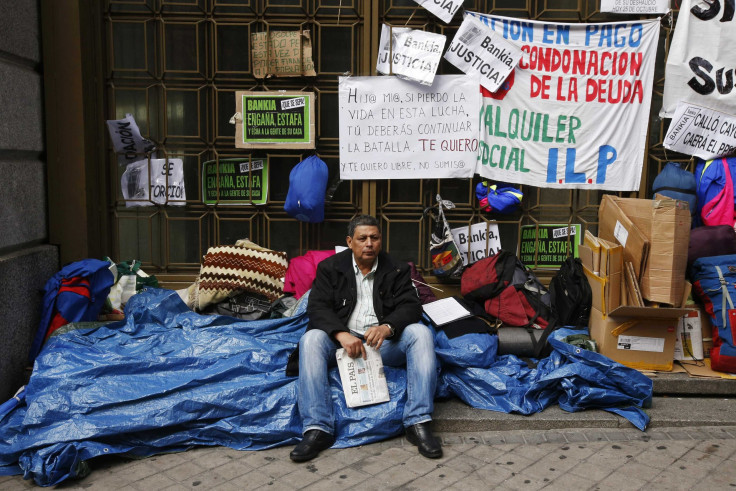Desperate Spanish Directing Violence At Banks, Themselves Over Foreclosures

The police blotter identified him simply as "Manuel G.B., 53."
Thursday, in the Spanish town of Burjassot, the unemployed Manuel walked to his front door and buzzed in the three men from the government whom he knew were there to evict him from his home.
As the judicial bureacrats climbed the stairs to his second-floor flat with their police escort, Manuel went to his room and said something to his wife, whom family later said was unaware of the pending foreclosure and was spending yet another day in bed battling severe depression.
A few seconds later, after petting his also-unemployed 23-year-old son and kissing him on the cheek, Manuel jumped headfirst off his balcony.
A few hours after Manuel G.B. was rushed to the local intensive-care unit, about two miles away in the port city of Valencia, 50-year-old Ignacio Cabanes walked into a branch of Banc Sabadell and began yelling that the bank had "taken everything" and "ruined his life," according to the local business newspaper El Mercantil Valenciano.
Having said all he wanted, Cabanes then went on to to conduct a one-man stress test of the bank with the aid of a "large sledgehammer." He took out the ATM kiosk and shaterred the bank's floor-to-ceiling glass door, the newspaper said, before getting too winded to keep going. He would regain enough strength to take a couple of swings at the police when they arrived. But before that happened, Cabanes took a few minutes out of his very busy day to hit on a young woman giving out perfume samples outside the bank who had stopped to watch him.
"Make me smell nice," Cabanes told her. "I'm about to be on TV."
"It's normal for these things to happen. People lose their patience with the banks and do crazy things," the bank's manager later told the newspaper.
Facing rising levels of joblessness and unable to make good on their obligations, the Spanish are getting violently -- even suicidally -- desperate. On Friday, the country's government admitted that, for the first time, the official unemployment rate had climbed to more than 25 percent. As a result of the worsening economy, many chronically unemployed Spaniards are defaulting on their mortgage loans. This month, the Spanish central bank announced that the proportion of defaulted loans in the country now amounts to 10.5 percent of all lending, another record, on the backs of a jump in delinquent mortgages.
Being unemployed and unable to pay off debt is humiliating enough, but what makes the situation truly dire is the fact the Spanish legal system does not let homeowners simply walk away from a foreclosed home, holding mortgage borrowers legally responsible for the balance of their loans even after banks repossess and auctions their properties. In Spain, where mortgages are forever, many foreclosures spell lifelong financial ruin.
Active resistance, and even violent reaction, is becoming more common.
On Friday, one protest group took over the Madrid headquarters of nationalized lender Bankia, a poster child for the banking excesses that caused the crisis. The protesters, many of whom said they were homeless after being foreclosed upon by the bank, sat in the lobby and refused to leave.
"We will stay here until Bankia offers us a solution," Manuel Ortiz, a protester, told Agence France-Presse via France 24.
Later in the day, the anonymous organizers of a general strike scheduled for Nov. 15, who have more than 38,000 followers on Twitter, sent out a link to an online manifesto letting people know about the anticipated tone of the protests that day.
Citing the example of protesters at previous rallies who had dressed as clowns -- to suggest the government was being run by buffoons -- the organizers said the protest next month would strive to be more "serious." They envisioned protesters "gnashing their teeth, saying 'Enough!,' barking, raving, biting, and looking to put a bit of fear" in the government's heart.
"The situation in the country is unjust, it's cruel, it's inhumane, incomprehinsible. Simply put, we are being massacred," the manifesto said. "We really don't understand how it is that this hasn't blown up once and for all."
© Copyright IBTimes 2025. All rights reserved.





















